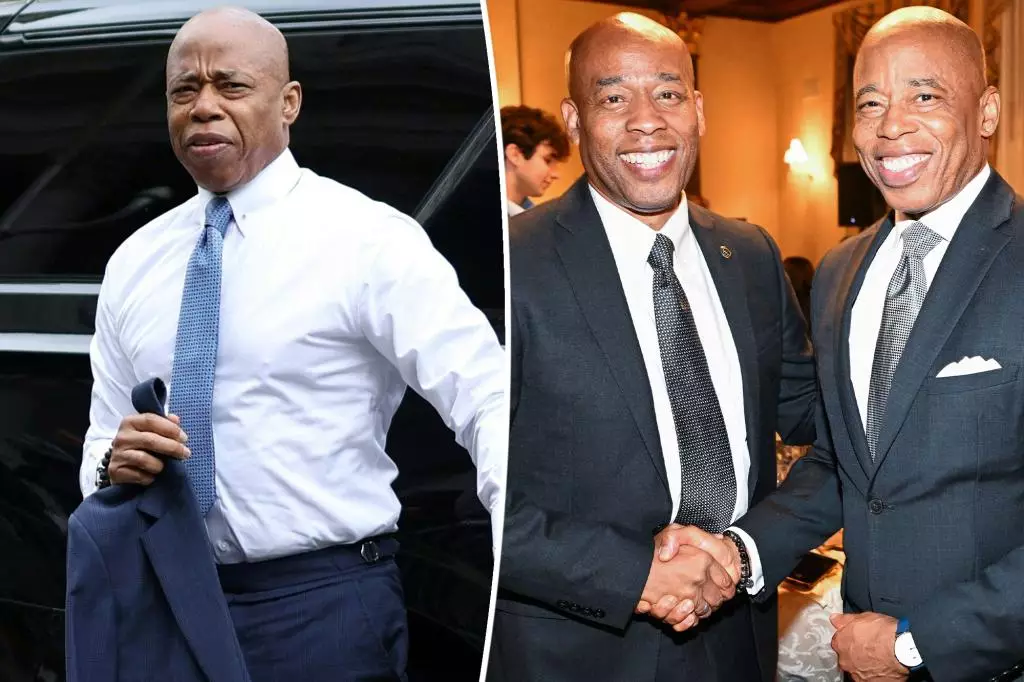Charitable organizations often rely on high-profile events to garner support, both financially and through community engagement. However, when these events fall through, the repercussions can reverberate throughout the organization and raise questions about transparency and integrity. The recent cancellation of Bernard Adams’ charity gala has brought to light various issues surrounding event management, communication with donors, and the ethical implications of nepotism within nonprofit operational structures.
Scheduled for Thursday, the highly anticipated gala aimed to gather support for Angels Helpers, a charity co-founded by Bernard Adams and Alisa Roever, with ticket prices soaring as high as $11,000. It was heavily promoted that New York City Mayor Eric Adams would deliver an inspirational speech, which added a layer of allure to the event. However, the sudden cancellation, announced under the guise of “unforeseen circumstances,” left many guests disgruntled. The lack of notifications regarding the cancellation raised eyebrows, particularly among attendees who made travel arrangements just to attend the function.
The charity’s website, in an apparent effort to clarify the situation, stated that the event had merely been postponed and that attendees would receive updates on rescheduling. This update, however, was seen as shaky ground for an organization that has a responsibility to keep its supporters informed, especially after events have been canceled. For some guests who arrived dressed in black-tie attire ready to participate in a night of elegance, the disappointment was palpable.
One notable source of contention arose from claims that attendees were not sufficiently notified about the cancellation. Despite the charity’s insistence that they had informed ticket buyers through phone calls and messaging applications, several guests reported learning of the cancellation only upon arrival at the venue. A representative from Angels Helpers maintained that the event details, including the right to refunds, were clearly communicated through updates on their website and via tech options like WhatsApp, aimed at keeping patrons informed.
However, the renegade issue of ticket sales’ poor performance preceding the event raises further questions about the organizational management of events. Were the organizational choices leading up to the gala reflective of sufficient planning or awareness about community engagement? The admission from Roever that poor ticket sales contributed to the cancellation sheds light on potential shortcomings in strategic fundraising and outreach.
The narrative becomes even more complex when considering the intertwined professional relationships within the Adams family. Bernard previously served as his brother Eric’s head of security, a role that raised concerns about nepotism and ethical conduct. Although he transitioned to a nominal advisory position, questions linger regarding the appropriateness of his leadership in a charitable organization amid these allegations. Critics argue that philanthropy should be insulated from potential conflicts that can diminish public trust.
While the charity aims to dedicate efforts towards enriching New York City’s youth with arts and culture, incidents surrounding the canceled event have diverted attention. Moreover, the involvement of high-profile political figures like Mayor Adams, who has reportedly been associated with questionable auction items—such as a dinner that he did not authorize—compounds the scrutiny surrounding the charity’s operations. These circumstances highlight a concerning lack of oversight and rigorous ethical standards that are crucial for the credibility of nonprofit organizations.
For Angels Helpers, this incident served as a crucial reminder of the importance of transparency, accountability, and proper communication, especially amid challenges in event planning and operational efficiency. Rebuilding trust with constituents will require more than an apology; a commitment to better practices must be front and center. Clear, consistent communication combined with demonstrable organizational integrity will be essential as they navigate the fallout from this gala misstep.
Moreover, the necessity for strong governance within charitable organizations cannot be overstated. Implementing robust policies that prevent conflicts of interest while ensuring that the organization operates within ethical guidelines will bolster public trust. By focusing on these essential components, they can move toward a more sustainable future, allowing Angels Helpers to fulfill its mission while inspiring confidence among supporters and potential donors.
The unfortunate cancellation of Bernard Adams’ charity event serves as a microcosm for broader issues within the nonprofit sector. A commitment to ethical practices, communication clarity, and trust-building will dictate the capacity of organizations like Angels Helpers to thrive and serve their communities effectively. As the charity progresses in the aftermath, the lessons learned may serve as a guiding beacon for future endeavors, underscoring the significance of honesty and accountability in philanthropy.
